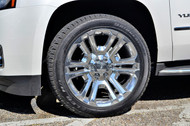5 Tips on How to Maintain a 4WD Vehicle
21st May 2021

Four-wheel drive (4WD) vehicles often require more maintenance than traditional two-wheel drive (2WD) vehicles. As you may know, they are characterized by the use of a double-axled drivetrain. When driving a 4WD vehicle, torque will be applied to all four wheels simultaneously, thus powering all of the wheels Whether you have a 4WD truck or a 4WD sports utility vehicle (SUV), though, you should consider the five following maintenance tips.
#1) Change the Transfer Case Fluid
You'll need to change the transfer case fluid in your 4WD vehicle. Most 4WD vehicles have either synthetic or conventional transfer case fluid. The purpose of this fluid is to lubricate the internal compartments of the transfer case so that the gears can turn more smoothly and with less resistance. With low levels of transfer case fluid, friction may occur that degrades the gears and contributes to premature failure.
#2) Inspect Tires
Don't forget to inspect your 4WD vehicle's tires on a regular basis. If you own a 4WD vehicle, there's a good chance you'll be doing some off-road driving. Driving on gravel or dirt roads, of course, is more taxing on your vehicle's tires. It will degrade the tread, resulting in smoother tires that are more susceptible to blowout.
#3) Target Grease Points
Another tip on how to maintain a 4WD vehicle is to target the grease point. Grease points are exactly what they sound like: spots or areas that require greasing. Many 4WD vehicles have several grease points. Some of them have grease points on the propeller shafts, whereas others have grease points on the chassis. Regardless, you should apply grease to these areas to protect your 4WD vehicle from damage.
#4) Top Off Fluids
Of course, there are other fluids besides the transfer case fluid that you'll need to ensure are topped off. 4WD vehicles use many of the same fluids as their 2WD counterparts, including coolant, engine oil, brake fluid and power steering fluid. You can check the levels of these fluids through the engine bay. Just remember to follow the manufacturer's recommendations when topping them off. Using the wrong type of fluid could cause damage that's difficult and costly to repair.
#5) Get the Suspension Inspected
Because of their heavy weight, 4WD vehicles are more susceptible to suspension problems than their 2WD counterparts. 4WD trucks and vehicles generally weigh more than those with a 2WD drivetrain. All of that extra weight can take a toll on their suspension. If you notice your 4WD vehicle feels bumpy or otherwise less-smooth when driving it, it may be suffering from suspension failure. Getting the suspension inspected at least once a year will allow you to catch problems such as this early.

